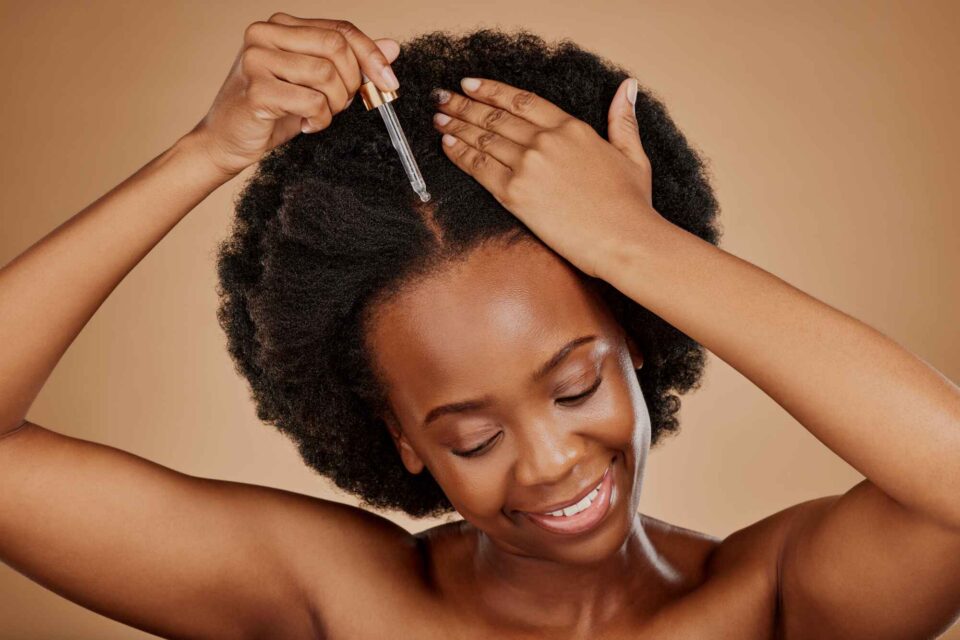African hair care blends tradition, science, and personal choice, focusing on keeping hair moisturized, reducing breakage, and highlighting the natural beauty of every curl, coil, and wave.
Table of Contents
African Hair Care Tip #1. Establish a Consistent Hair Care Routine
A simple and effective approach is the “Cleanse, Moisturize, Style, Repeat” method. This routine emphasizes regular cleansing to remove buildup, moisturizing to hydrate the hair, and styling to protect and define curls.
African Hair Care Tip #2. Prioritize Moisture
African hair tends to be drier due to its structure, which can impede the natural oils from traveling down the hair shaft.
To combat this, many adopt the LOC (Liquid, Oil, Cream) or LCO (Liquid, Cream, Oil) method.
These techniques layer products in a specific order to lock in moisture and enhance curl definition. (I personally swear by the LOC method).
3. Use Gentle Cleansing Products
Opt for sulfate-free shampoos that cleanse without stripping natural oils.
Shampooing once a week or every 7–12 days is often sufficient, as over-washing can lead to dryness.
4. Deep Condition Regularly
Incorporate deep conditioning treatments into your routine to restore moisture and strengthen hair. These treatments are especially beneficial after cleansing to replenish lost nutrients.
5. Detangle with Care
Always detangle hair when it’s damp and conditioned, using fingers or wide-tooth combs to minimize breakage.
Starting from the tips and working upwards can help prevent unnecessary stress on the hair.
6. Embrace Protective Styles
Styles like braids, twists, and buns shield hair from environmental factors and reduce manipulation, promoting growth and preventing damage.
Ensure these styles aren’t too tight to avoid tension on the scalp.
7. Trim Regularly
Regular trims help eliminate split ends and promote healthy growth. Even if you’re aiming for length, maintaining healthy ends is crucial.
8. Nighttime Care
Protect hair at night by wearing a satin or silk scarf or bonnet.
These materials reduce friction and moisture loss compared to cotton.
Alternatively, use satin pillowcases.
9. Explore Natural Oils

Incorporate oils like marula, black seed, or argan into your routine. These oils offer benefits such as added moisture, shine, reduced frizz, and heat protection. Marula oil, for instance, is rich in fatty acids and antioxidants, making it suitable for various hair types, especially dry or brittle hair.
10. Understand Your Hair’s Needs
Recognize that each individual’s hair is unique.
Experiment with different products and techniques to discover what works best for you. Consider factors like porosity, density, and curl pattern when selecting products.
By adopting these practices, you can maintain healthy, vibrant hair that reflects your unique beauty.
African hair is a remarkable testament to the rich diversity and cultural heritage found across the continent.
With a myriad of textures, colors, and styles, an African hair do showcases a wealth of beauty that deserves to be celebrated and embraced.
From intricate braids to gravity-defying afros, this blog post will delve into the fascinating world of African hair, exploring its significance, the importance of proper care, and offering some product suggestions along the way.
READ ALSO: 7 Beautiful Bridesmaid Braid Styles & More
The Historical and Cultural Significance of an African Hair Do
African hair has deep-rooted historical and cultural significance. Across various African cultures, hairstyles have served as expressions of identity, heritage, and even social status.

Photo Credits: My Wedding, Èyí Dára